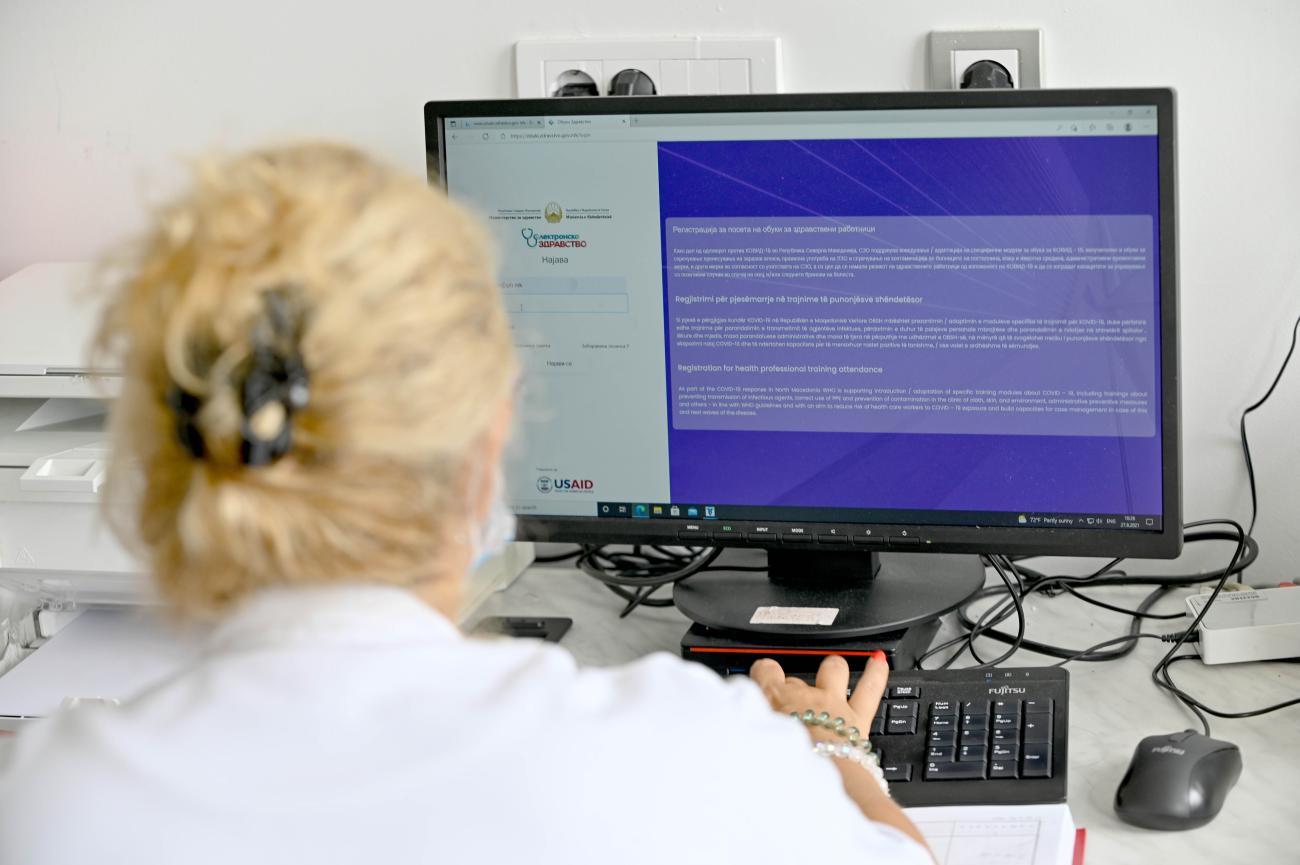WHO and UN promote the use of digital technologies to improve immunization services in North Macedonia

The COVID-19 pandemic has triggered rapid integration of digital technologies in North Macedonia’s public health sector.
From technologies that allow people to access immunization services more easily, to improved monitoring of how policies affect the health of the population and better ways of empowering the health workforce as well as patients, digital tools have opened a wealth of possibilities for progress towards universal health for all.
Ever since the beginning of the pandemic, national health authorities have made efforts to unlock the full potential of the available technology – to improve how services are provided and how the health system is managed. WHO and UN in North Macedonia has supported these efforts as part of the joint programme “Safe and Innovative Health Services during the COVID-19 pandemic in North Macedonia” implemented by UNICEF, WHO and UNFPA, funded by the COVID-19 Fund.
Strengthening data collection to provide safe, innovative and quality immunization services
“Harnessing the power of digital technologies is essential for more responsive, cost-effective and data-informed health services, both when it comes to COVID-19 and routine immunization. WHO has supported the introduction of innovative digital tools in the health sector as part of the Government’s efforts to overcome challenges in planning, logistics management, vaccination administration, and immunization monitoring.” highlighted Dr Anne Johansen, the Regional Director’s Special Representative to North Macedonia and the Head of WHO Country Office a.i. in Skopje.
One digital intervention is the establishment of a national electronic immunization database connected with the national e-health records to provide accurate and timely data on immunization. The Electronic Immunization Register (EIR) was upgraded to include the registration of the COVID-19 vaccines from individual patient records, while data on immunization of children and newborns were retroactively entered into EIR from the paper-based immunization cards.
Other tools were introduced to meet the needs of the population such as easier access to the National COVID-19 Immunization Certificate through a web portal, and sending reminders to parents to have their children return for vaccinations through a mass notification system.
Strengthening data collection for both COVID-19 and routine immunizations opens up possibilities for better monitoring, coordination and evidence-based planning and decision making. At the same time, the overall modernization of the immunization process helps to reduce administrative tasks, allowing health workers to put patients first and devote more quality time to the care of patients.
Tapping into technology’s potential to enhance professional learning
As one of the most trusted sources of information, health workers play a key role in achieving high vaccination uptake. Their attitudes and knowledge about immunization can greatly influence their patients’ vaccination decisions. Providing health professionals with knowledge resources and tools gives them the means and confidence to be more effective in their work and help achieve high vaccination uptake.
Using digital technologies to inform and train health care workers is one of the best ways to reinforce their professional skills.
“WHO in North Macedonia has developed electronic training packages to equip health care workers with new skills and knowledge on immunization to help them thrive and in doing so strengthen the national health system for the benefit of the whole population”, noted Dr Johansen.
Around 60 managers of immunization programs from across the country were trained in planning, management, monitoring and evaluation of the immunization system. In addition, 340 health care workers were trained on vaccines cold chain, immunization safety, microplanning for reaching every community, managing an immunization session, monitoring and surveillance and partnering with communities.
Accredited OpenWHO training courses related to COVID-19 and vaccination were also adapted into local languages. The knowledge gained from these courses helps health care workers to improve the quality of immunization services, share innovative vaccination practices with their peers and promote vaccination uptake to their patients.
The way forward
“Integrating digital technologies into the health system can improve the ways of delivering health services and bring about long-term benefits. Prospectively, these activities will enable increasing of the vaccination coverage for the regular as well as COVID-19 vaccinations.”, concluded Dr Johansen.
WHO will continue to support North Macedonia’s COVID-19 response and recovery, including using digitalization for maximum impact on the population’s health.
“Safe and Innovative Health Services in Times of COVID-19 in North Macedonia” is a joint programme that aims to improve access to sexual and reproductive health, immunization, and gender-based violence support services for women, adolescent girls and children, with a special focus on the most vulnerable population in remote and underserved areas. The activities are being implemented jointly by UNICEF, WHO and UNFPA and made possible by contributions to the UN Response and Recovery Fund from the governments of Norway, Netherlands, Switzerland, Denmark, Sweden, Republic of Korea, Finland, Austria, United Kingdom, Spain, New Zealand, United States of America, Iceland, Croatia, Portugal, Thailand, Slovak Republic, Romania, Cambodia, Cyprus and Philippines.


